
Holland is the 19th studio album by American rock band the Beach Boys, released January 8, 1973 on Brother/Reprise. It is their first album recorded without Bruce Johnston since 1965, their second with Blondie Chaplin and Ricky Fataar, and their final studio album created under the de facto leadership of Carl Wilson and manager Jack Rieley. The LP was originally packaged with a bonus EP, Mount Vernon and Fairway, which consisted of a 12-minute fairy tale written and produced by Brian and Carl Wilson.

Carl and the Passions – "So Tough" is the 18th studio album by American rock band the Beach Boys, released May 15, 1972 on Brother/Reprise. The album is a significant musical departure for the band and is the first to feature the Flames' Blondie Chaplin and Ricky Fataar as additions to their official line-up. It sold poorly and was met with lukewarm reviews, but later gained stature as a cult favorite among fans.

15 Big Ones is the 20th studio album by the American rock band the Beach Boys, released July 5, 1976 on Brother/Reprise. It includes a mix of original songs and renditions of rock 'n' roll and R&B standards. The LP was the band's first album with production credited solely to Brian Wilson since Pet Sounds (1966). As such, its release was accompanied by a controversial media campaign that declared his comeback as an active member of the Beach Boys' recording and touring group.
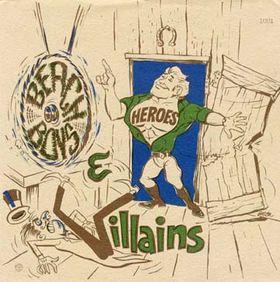
"Heroes and Villains" is a song by the American rock band the Beach Boys from their 1967 album Smiley Smile and their unfinished Smile project. Written by Brian Wilson and Van Dyke Parks, Wilson envisioned the song as an Old West-themed musical comedy that would surpass the recording and artistic achievements of "Good Vibrations". The single was Brother Records' first release and failed to meet critical and commercial expectations, although it was a hit record, peaking at number 12 in the U.S. and number 8 in the UK.

"Rock and Roll Music" is a song written and recorded by Chuck Berry. It has been widely covered and is one of Berry's most popular and enduring compositions.

Ten Years of Harmony is an official double album compilation album released by the Beach Boys in 1981, and spanning their entire Brother Records-era up to that point (1970–80), including some unreleased or rare material. Although the song "Darlin'" had originally been recorded in 1967 while the group was signed to Capitol Records, the version on Ten Years of Harmony was recorded live in 1973 for the album The Beach Boys in Concert.

The Honeys were an American girl group, formed in Los Angeles in 1958, that initially comprised sisters Marilyn, Diane, and Barbara Rovell. Barbara was later replaced by their cousin, Ginger Blake. After 1962, the Rovell Sisters were rechristened "the Honeys" by the Beach Boys' Brian Wilson, who envisioned the group as a female counterpart to his band. Wilson served as the Honeys' record producer and chief songwriter, and later married Marilyn in late 1964.

American Spring was an American pop music duo formed in Los Angeles, California. It consisted of sisters Marilyn Wilson and Diane Rovell, who had earlier been members of girl group the Honeys. As with the Honeys, Brian Wilson played an integral role with American Spring, producing some of their recorded material.

"Forever" is a song by American rock band the Beach Boys from their 1970 album Sunflower. It was written by Dennis Wilson and Gregg Jakobson. Dennis sang lead vocal. His brother Brian assisted with the arrangement.
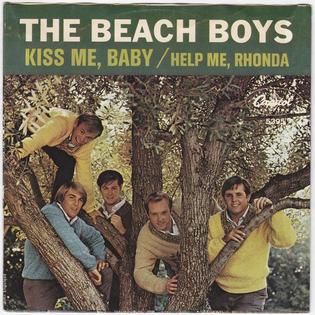
"Kiss Me, Baby" is a song by the American rock band the Beach Boys from their 1965 album The Beach Boys Today!. Written by Brian Wilson and Mike Love, it was issued as the B-side of the group's "Help Me, Rhonda" single on April 5.
"Funky Pretty" is a song by American rock band the Beach Boys from their January 1973 album Holland. Themed around astrology, the song was written by Brian Wilson, Mike Love, and Jack Rieley. Carl Wilson explained that the song was quickly recorded in a "spontaneous flurry". Brian was an active participant in its production, a rare occurrence at the time. In April 1973, it was issued as the B-side to their single "California Saga/California".
"Time to Get Alone" is a song by the American rock band the Beach Boys from their 1969 album 20/20. Written by Brian Wilson and produced by Carl Wilson, it is a baroque pop waltz. Brian originally intended the song for Redwood, the band that evolved into Three Dog Night.
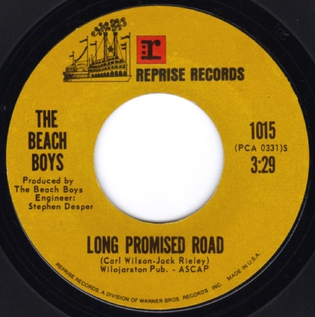
"Long Promised Road" is a song by the American rock band the Beach Boys from their 1971 album Surf's Up. It was written by Carl Wilson and Jack Rieley. Aside from a few guitar instrumentals written in the early days of the band and collective co-writing credits, the song is Wilson's first solo composition, and he plays all of the instruments himself.
"Don't Back Down" is a song by the American rock band the Beach Boys and the final track on their 1964 album All Summer Long. Written by Brian Wilson and Mike Love, the lyrics describe a group of surfers who "don't back down from that wave", explaining that they "gotta be a little nuts" to show the girls "who's got guts". It was the group's last surfing-themed song until 1968's "Do It Again".
"Don't Hurt My Little Sister" is a song by the American rock band the Beach Boys from their 1965 album The Beach Boys Today!. Written by Brian Wilson with additional lyrics by Mike Love, it was inspired by Wilson's interactions with sisters Marilyn, Diane, and Barbara Rovell. It was produced on June 22, 1964, making it the earliest-recorded song on the album.
"Susie Cincinnati" is a song by the American rock band the Beach Boys that was recorded during the sessions for their 1970 album Sunflower. It was written by Al Jardine about a female cab driver from Ohio.

"It's OK" is a song by the American rock band the Beach Boys from their 1976 album 15 Big Ones. Written by Brian Wilson and Mike Love, it is an upbeat song about celebrating summer fun. It was issued as a single on August 9, 1976 and reached number 29 on the Billboard Hot 100 singles chart.
"Lady" is a song written by Dennis Wilson, recorded by him with Daryl Dragon and released under the name "Dennis Wilson & Rumbo" in the United Kingdom on 4 December 1970, on Stateside Records. The song served as the B-side of the "Sound of Free" single. The single was not issued in the United States.
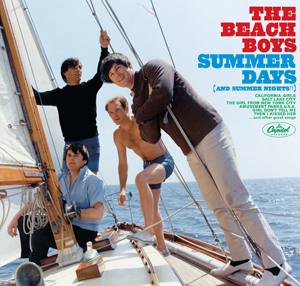
Summer Days is the ninth studio album by American rock band the Beach Boys, released on July 5, 1965, on Capitol. The band's previous album, The Beach Boys Today!, represented a departure for the group through its abandonment of themes related to surfing, cars, and teenage love, but it sold below Capitol's expectations. In response, the label pressured the group to produce bigger hits. Summer Days thus returned the band's music to simpler themes for one last album, with Brian Wilson combining Capitol's commercial demands with his artistic calling.
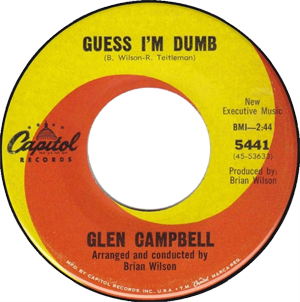
"Guess I'm Dumb" is a song recorded by American singer Glen Campbell that was released as his seventh single on Capitol Records on June 7, 1965. Written by Brian Wilson and Russ Titelman, it is a love song that describes a man who regrets ending a relationship after he realizes he still harbors deep feelings for his former lover. The single failed to chart.














